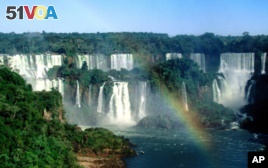Rainforests are critically important to our well-being. Because they absorb carbon dioxide, a greenhouse gas, and produce oxygen, they are sometimes called the lungs of the planet. Despite the fact that rainforests cover only 12 percent of the land-area of the Earth, they are home to between 50 and 90 percent of the world's plant and animal species, and for local populations they are a vital source for food, fiber, fuel and medicines. Tropical forests regulate global and regional climate-systems, and release moisture into the atmosphere, which then returns to earth in the form of rain.

The Iguassu Falls in Brazil's Atlantic Rainforest. (file)
But where the land has been logged, there are no longer trees to produce the rain cycle which cools down the atmosphere, or to reduce carbon dioxide levels, contributing to climate change. Because of tropical deforestation, animal and plant habitat is disappearing, and at least one species dies out every day.
Thus, the United States has partnered with the private sector, other governments and civil society organizations to form the Tropical Forest Alliance 2020, or TFA 2020. The alliance aims to mobilize and coordinate actions by all partners to reduce tropical deforestation related to key agricultural commodities such as palm oil, soy, beef, and paper and pulp.
TFA 2020 was born out of discussions between the U.S. Government and the Consumer Goods Forum, a network of over 400 companies with annual sales topping $3 trillion. This is a whole-of-government effort engaging agencies from across the U.S. government, with leadership from the U.S. Agency for International Development. Other partners are the Governments of the Netherlands, Norway, and the United Kingdom and civil society organizations, Conservation International, the Dutch Sustainable Trade Initiative, and World Resources Institute.
In support of TFA 2020, USAID announced in early July that it will contribute $5.5 million to a separate but related public-private partnership with the World Resources Institute and private sector partners. With the help of this new tool, TFA 2020 partners will be able to more easily monitor tropical deforestation, and then quickly act on the information.
The United States has consistently worked to promote the conservation of tropical forests by advancing innovative and cooperative development approaches, diverse technical expertise and services, and diplomatic leadership. With the new multi-national, public-private TFA 2020 partnership, we look forward to further increasing the breadth of our engagement.